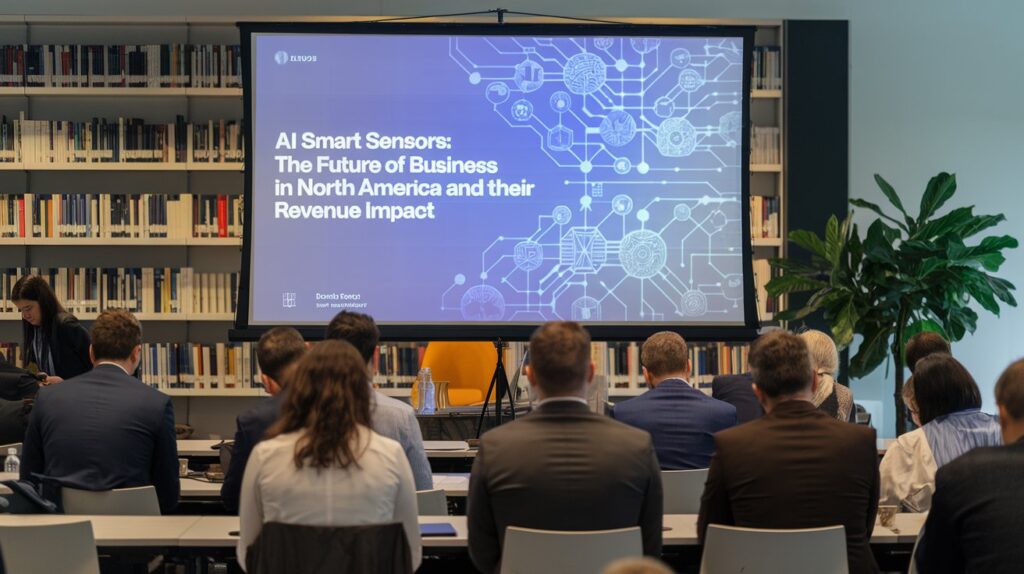In the ever-evolving digital landscape, businesses are increasingly turning to Artificial Intelligence (AI) and smart technologies to enhance efficiency, streamline operations, and stay competitive. Among these innovations, AI smart sensors stand out as game-changers, especially in North America, where the adoption of advanced technologies is rapidly accelerating across industries. But what exactly are AI smart sensors, and how will they impact business revenues?
Get More Information:
https://www.marketsandmarkets.com/pdfdownloadNew.asp?id=43119772

This blog dives into the role of AI smart sensors, explores their applications, and analyzes their potential revenue impact on businesses in North America.
What Are AI Smart Sensors?
AI smart sensors combine traditional sensor technology with artificial intelligence algorithms. While traditional sensors collect data on environmental conditions such as temperature, pressure, or motion, AI smart sensors go a step further. They not only capture data but also analyze it in real-time, providing meaningful insights and enabling automated decision-making without human intervention.
These sensors are equipped with machine learning capabilities, which means they can learn from the data they collect over time, making predictions, recognizing patterns, and improving performance without being explicitly programmed for every scenario. This intelligence enables smarter, more precise monitoring, control, and optimization of processes.
Key Applications of AI Smart Sensors in Business
AI smart sensors are being integrated into a wide array of industries across North America, helping businesses optimize their operations in several key areas:
- Manufacturing and Industrial Automation:
- AI-powered smart sensors are revolutionizing industrial automation by enabling predictive maintenance. These sensors can monitor machinery, detect early signs of wear or malfunction, and predict when equipment will need repairs, minimizing downtime and reducing costly emergency repairs.
- By ensuring optimal operation, smart sensors help increase production efficiency and extend the lifespan of machinery, translating into direct cost savings and higher productivity.
- Supply Chain and Logistics:
- In logistics, AI smart sensors play a vital role in monitoring and optimizing the transportation and storage of goods. These sensors track real-time conditions such as temperature, humidity, and location, ensuring that products are stored and transported in optimal conditions.
- Businesses benefit from real-time insights, reducing spoilage and loss, especially in industries like food and pharmaceuticals, where temperature-sensitive goods must be carefully managed.
- Smart Retail:
- Retailers are adopting AI smart sensors to monitor foot traffic, customer behavior, and inventory levels. By analyzing data in real-time, retailers can optimize store layouts, predict demand trends, and ensure that shelves are always stocked with high-demand products.
- AI smart sensors also enable automated checkout systems, reducing labor costs and enhancing the customer experience.
- Energy Management:
- AI smart sensors in energy management systems help businesses optimize energy consumption by monitoring and adjusting heating, ventilation, air conditioning (HVAC), and lighting systems based on real-time usage patterns.
- This leads to significant energy savings, contributing to sustainability goals while reducing operational costs.
- Healthcare:
- In the healthcare sector, AI smart sensors enable remote patient monitoring, improving patient outcomes while reducing the burden on healthcare systems. These sensors can track vital signs, detect anomalies, and alert healthcare providers when intervention is needed.
- Hospitals and care facilities also use AI sensors to monitor equipment and environmental conditions, ensuring patient safety and compliance with regulations.
Revenue Impact on Businesses in North America

AI smart sensors are not just driving operational improvements; they are directly impacting business revenues in multiple ways. Here are some of the primary ways businesses in North America can experience a revenue boost by adopting AI smart sensor technology:
- Cost Reduction Through Operational Efficiency:
- Increased Efficiency: By automating processes and minimizing human intervention, AI smart sensors can drastically reduce labor costs. For example, manufacturers can cut costs by using predictive maintenance to avoid costly machinery breakdowns.
- Energy Savings: Smart energy management systems can reduce electricity bills by adjusting energy consumption based on real-time data, cutting energy waste and associated costs.
- Revenue Growth via Enhanced Productivity:
- Faster Decision-Making: AI smart sensors provide real-time data analysis, allowing businesses to make faster and more informed decisions. This agility can translate into faster production cycles, quicker responses to market changes, and an overall boost in productivity.
- Improved Product Quality: Sensors that monitor and adjust processes in real time ensure higher product quality and consistency, reducing waste and increasing customer satisfaction. Better quality products lead to reduced return rates and higher customer loyalty.
- New Revenue Streams from Data-Driven Services:
- Data Monetization: Companies adopting AI smart sensors may generate new revenue streams by selling the insights and data gathered by these devices. For example, businesses in the agriculture industry could use smart sensors to collect data on soil conditions and sell this data to other farmers or agricultural companies.
- AI-Enhanced Services: Many businesses can offer AI-enhanced services as a premium feature. For instance, facilities management companies could offer automated building management solutions powered by AI smart sensors as a value-added service.
- Reduced Risk and Lower Insurance Costs:
- Risk Mitigation: AI smart sensors help businesses mitigate risks by providing early warnings of potential equipment failure, environmental hazards, or security breaches. This proactive approach reduces the risk of costly disruptions and accidents.
- Insurance Premium Reductions: Companies using AI-powered safety and monitoring systems may be eligible for lower insurance premiums, as these technologies can significantly reduce operational risks.
- Sustainability and Compliance Incentives:
- Meeting Regulatory Requirements: In industries like healthcare and food production, where compliance with strict regulations is mandatory, AI smart sensors can help businesses meet requirements more efficiently. This can prevent costly fines and enhance brand reputation.
- Attracting Eco-Conscious Consumers: Businesses that leverage AI smart sensors to improve energy efficiency and sustainability can appeal to a growing base of eco-conscious consumers, increasing market share and boosting sales.
Projected Market Growth and Future Opportunities
According to market reports, the global AI smart sensor market is expected to grow significantly, with North America being one of the fastest-growing regions. The market’s expansion is being fueled by several factors, including advancements in machine learning, 5G connectivity, and increasing demand for automation in various sectors.
In North America, particularly in industries like manufacturing, retail, logistics, and healthcare, AI smart sensors are projected to become integral tools for business operations, creating a large-scale economic impact.
The ability of AI smart sensors to optimize efficiency, lower costs, and unlock new revenue streams makes them a critical investment for forward-thinking companies. Businesses that adopt these technologies now will not only stay ahead of the competition but will also position themselves for long-term growth in a tech-driven future.
AI smart sensors are ushering in a new era of efficiency and innovation for businesses across North America. Their ability to provide real-time data analysis and decision-making is transforming industries from manufacturing to healthcare. The revenue impact is clear: reduced costs, increased productivity, and the potential for new income streams make AI smart sensors a crucial component of the modern business landscape.